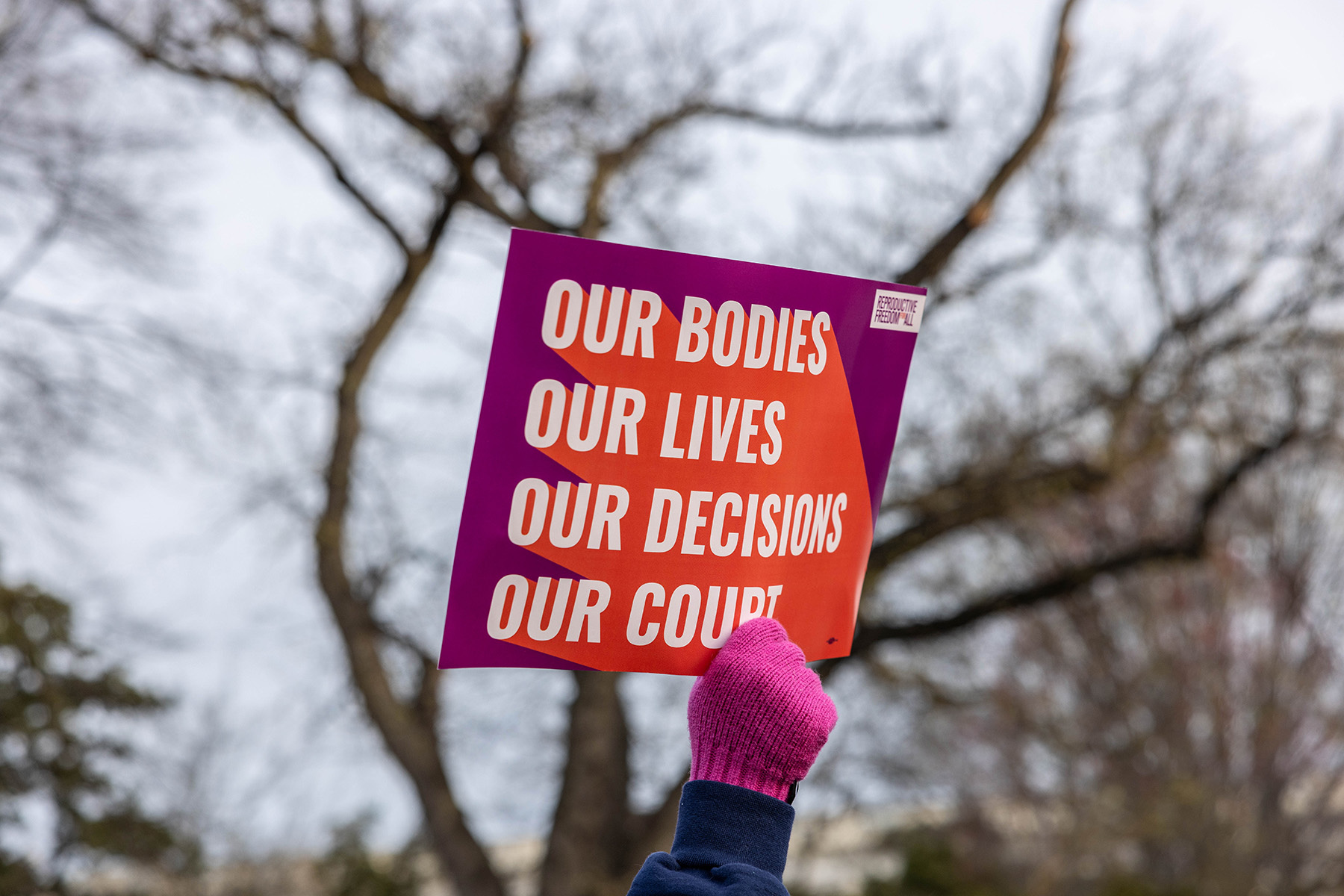Sarah ordered her first set of abortion pills in early December, as soon as she realized the condom had broken.
She wasn’t ready to be a parent. She was in a committed relationship but didn’t want a baby to be what kept her tied to her partner. She was still trying to develop her career as an energy analyst, and she didn’t earn enough money to support a child in Austin.
And she simply didn’t want to be a mom — at least not at this stage of her life.
“This is my personal choice, and I’m not ready right now,” she said. “It’s a shift in identity that I wasn’t ready for.”
Abortion is illegal in Texas, so Sarah searched Google, browsed Reddit and even asked ChatGPT about her options. Her research led her to Aid Access, an online mail-order service that would connect her to health professionals in states where abortion remains legal. She verified her identity, paid $150 and received abortion pills in a few days.
About 10 days after the broken condom, she saw a faint positive line on a pregnancy test. A few days later, she took the abortion pills.
For Sarah, whose full name is being withheld because of the legal risks of ordering abortion pills in Texas, the process of terminating her pregnancy was isolating and arduous. She kept getting positive pregnancy tests after she took the abortion pills, and weeks later, a visit to a local reproductive health center confirmed her suspicions: Hers was one of the 2 to 5 percent cases in which a medication abortion had failed. But Sarah couldn’t find any medical professionals who would talk to her about her options — or even whether it was safe to stay pregnant after a failed abortion. Every time she brought up abortion, she said, they said it was something they couldn’t discuss.
-
Read Next:
Her only source of support, she realized, was the internet — the people online who shared their stories and resources with her, and websites like Aid Access, which told her where and how to find pills, what the process felt like and the signs that might indicate if the abortion had worked.
“Reddit was my doctor,” she said. “That was the scariest thing about this all. That was my only source of information.”
Sarah, like hundreds of thousands of Americans living in states with abortion bans, would ultimately find her way around her state’s law, relying once again on Aid Access and her community on Reddit to terminate her pregnancy safely and successfully. Since the fall of Roe v. Wade, online services such as Aid Access and the Massachusetts Medication Abortion Project have emerged as pivotal abortion suppliers for people living in states with bans — which helps illustrate why, despite 12 states banning abortion almost entirely, the number of abortions in the United States has continued to rise. An October report from the Society of Family Planning estimated that close to 10,000 abortions per month were the result of health care providers in states with “shield laws” — statutes meant to protect them from prosecution under bans like Texas’ — mailing pills to people in states with restrictions.
This telehealth “loophole,” as abortion opponents would call it, has vexed the anti-abortion movement. But now in Texas, the largest state to have banned abortion in most circumstances, state lawmakers are championing a bill that would target those same provider networks Sarah relied on. Senate Bill 2880 received approval from the Texas Senate on Tuesday night; a companion bill is working its way through the House, with weeks to go before the state’s June deadline.
If I don’t have access, I don’t have choice.”
Sarah
Health care professionals and abortion law scholars are still deciphering the possible impact of the bill. So, too, are people like Sarah.
“It would be terrifying not having that access,” Sarah said. “If I don’t have access, I don’t have choice.”
SB 2880, a top priority of anti-abortion group Texas Right to Life, focuses specifically on people who manufacture, distribute, mail or otherwise provide abortion medication in Texas.
The bill’s structure — relying on civil lawsuits filed by private citizens, and wrongful death suits from “the mother or father of an unborn child” — means it’s still not fully clear who ultimately could be held liable, and how far-reaching the threats could be. But in interviews and on the Senate floor, the bill’s backers have said they intend to target the medical professionals mailing abortion pills through websites like Aid Access.
It’s a step back from the version lawmakers first introduced in March, which would have gone after all aspects of the abortion support: the funds that give people money to leave the state for travel and the websites that help people find information about out-of-state abortion options.
“It’s still extremely effective,” said John Seago, the head of Texas Right to Life. “It gives us the option to go after our main targets — the ones running the websites.”
The latest version of the bill authorizes civil lawsuits against distributors of abortion pills, allowing private citizens to sue anyone who distributes the medications for at least $100,000 in damages. The bill asserts that another state’s shield laws, including those in states like New York, Massachusetts and California, are not a valid defense against such suits.
-
Read Next:
“The state of Texas is effectively deputizing all of its citizens with the ability to bring perhaps frivolous and perhaps unconstitutional lawsuits,” said Jenna Lauter, a policy counsel at the New York Civil Liberties Union who focuses on reproductive rights. “New York will do everything it can under the law to refuse to cooperate or share information that would facilitate these kinds of harassing lawsuits. But the law in theory would create an opportunity for anyone — an ex-partner, an anti-abortion activist, anyone — to interfere with someone’s reproductive health care decisions.”
Lawmakers elsewhere are similarly weighing how to curb abortion by mail. In Alabama, a bill filed in April would ban phone service and internet companies from taking people to websites with information about online abortion medication services, and would make it a felony to prescribe and mail those pills — though that proposal has yet to make it through a committee vote and is up against a May 15 deadline before the legislature adjourns.
Legal scholars and abortion providers said it’s fundamentally unclear how the Texas bill would work in practice — who might be in legal jeopardy, what kind of risks they might face, and whether the new penalties proposed by SB 2880 would survive legal challenges.
Texas has successfully flouted federal protections before, notably, with a 2021 statute that effectively banned abortion at six weeks of pregnancy even before Roe v. Wade was overturned. That law, like SB 2880, relied on a private lawsuit mechanism, which deterred people from offering otherwise legal services and allowed it to survive extensive legal challenges, including in the U.S. Supreme Court.
Said Rachel Rebouché, dean at the Temple University law school and an expert in abortion law, “This is Texas legislators trying the same strategy to try to circumvent a federal constitutional challenge.”
Outside of Texas, some health care providers said that even if the state enacts new restrictions, they won’t change their practices. They are counting on their own states to protect them.
“We continue to believe that what we are doing is legal and protected by our shield law, and Massachusetts would protect us,” said Dr. Angel Foster, who provides telehealth abortions through the Massachusetts Medication Abortion Project.
But the shield laws these doctors are counting on have already come under scrutiny. Dr. Margaret Carpenter, a New York-based physician, has been subject to criminal charges filed in Louisiana and civil charges filed in Texas for allegedly mailing abortion medication to people in those states.
So far, New York has declined to enforce a Texas-based civil penalty and has refused to extradite Carpenter to Louisiana, citing the Empire State shield law in both cases. In the long term, the strength of those laws — against existing abortion bans and possibly new legislation like Texas’ — will be settled through the federal courts.
Even now, there are questions about shield laws’ ability to protect health professionals from civil lawsuits like the ones SB 2880 would further enable. The U.S. Constitution holds that states must enforce the civil judgments enacted by other courts in other states, though there can be exceptions to that rule.
Whether these bills are successful or not, they cause such great fear, and we see that. We know that.”
Kathy Kleinfeld
But some health care providers, including in Texas, said that the impact will be felt regardless of if it takes effect.
“Whether these bills are successful or not, they cause such great fear, and we see that. We know that,” said Kathy Kleinfeld, whose Houston-based reproductive health clinic advises pregnant patients on their out-of-state abortion options. “We hear it on the phones. We encounter it when people come in seeking our help.”
Kleinfeld fears that if the bill is enacted, abortion-seeking patients who come to clinics like hers — Houston, one of the country’s most diverse cities, is a drive of at least nine and a half hours from the closest clinic — will be left without recourse.
“It will be devastating for the state of Texas,” Kleinfeld said.
Services like Aid Access have played a critical role in enabling abortion in Texas and other states with strict bans, offering an option that can be much more affordable than travel.
When Mariah learned she was pregnant just over a year ago, she turned immediately to the internet. She works full-time at a UPS warehouse and has two small children: a 7-year-old son and 4-year-old daughter.
Mariah, who also asked to have her full name withheld, was shocked to learn an option like Aid Access existed. She wouldn’t need to drive almost 400 miles from her home in Arlington to Wichita, Kansas, the closest option for an in-person abortion. She wouldn’t need to find child care, or take time off from work. And the $150 cost was a fraction of what she would have had to spend if she traveled to a clinic.
Her abortion was easy; she completed it at home on a weekend. If something like Aid Access hadn’t been available, she said, she wasn’t sure what she would have done — maybe try to end her pregnancy at home, with whatever she could find in the house.
-
Read Next:
Despite the growing prevalence of telehealth abortion, research published in 2022, before Aid Access expanded its American footprint, found that many people seeking to end their pregnancies at home relied on methods that are ineffective, such as herbs, or that involve self-harm. It’s not clear what would happen if Texans could no longer find information online about how to order abortion pills, and to what extent they might turn to options that risk their health and safety.
“Abortion saves lives at times,” Mariah said. “It really helps out families who can’t afford a plethora of children.”
Already, Texans seeking abortions said it’s difficult to know whom to trust. Mariah told a few of her friends when she ordered her medications. But she didn’t say anything to her doctor. She wasn’t sure if it would be safe, given the state’s strict abortion bans.
The idea that the state might try to keep people from the options she used “is like a dictatorship,” she said.








